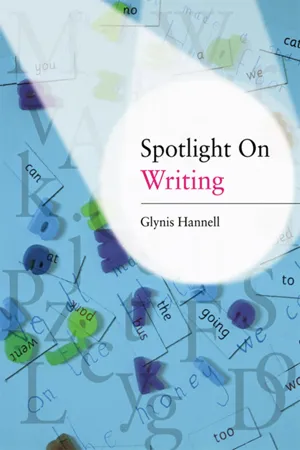
- 128 pages
- English
- ePUB (mobile friendly)
- Available on iOS & Android
About This Book
Spotlight on Writing offers teachers a wide variety of topics and activities to stimulate, engage, challenge, entertain and extend all pupils' writing skills.
This extremely practical resource provides busy teachers and teaching assistants with a collection of worksheets that can be used as instant, educationally appropriate learning activities written specifically with the inclusive classroom in mind.
The wide variety of exercises encourages pupils to think about writing and to develop skills in writing facts and information, creative writing and editing, whilst building confidence and motivation. Teachers can use this book to develop a flexible inclusive approach, comprising individualised materials and opportunities for extended practice.
All the books in this series:
-
- Promote effective intervention and inclusion strategies for teachers and teaching assistants
-
- Provide materials that are solidly grounded in an understanding of how children learn and the particular difficulties of children with special needs.
-
- Stimulate discussion and interaction
-
- Can be used as part of an individual or small group learning programme for a child with special needs
-
- Provide 'whole class' materials that can also engage older children or those with a higher level of achievement
-
- Offer teachers quick, fun activities that never require additional resources, special materials or preparation.
Spotlight on Writing is an essential tool for any teacher striving to offer every pupil opportunities to maximise their own potential and develop strong writing skills.
Frequently asked questions
Information
Chapter 1
Introduction
Writing: an essential skill
Poor writing skills
Your inclusive classroom
What is ‘writing’?
The difference between spoken and written language
- a wider, more expressive vocabulary;
- a more careful selection of words;
- more formal vocabulary, with less use of slang, colloquialisms and so on;
- more abstract language;
- more formal sentence structures;
- better organisation of ideas;
- properly constructed sentences;
- a monologue style in which the writer is the only ‘speaker’;
- a ‘voice’, where the reader is assigned the role of listener (often with little prior knowledge of the topic assumed);
- regular use of compound sentences;
- stricter adherence to the rules of grammar;
- opportunities for editing, correction and polishing before completion;
- total reliance on the written word (no body language or facial expressions to supplement the message);
- a less spontaneous, more considered use of language;
- a need for correct spelling and punctuation.
Language difficulties and writing
- limited vocabulary;
- difficulties in formulating sentences;
- problems in ‘finding’ words;
- poor organisation of what they want to say.
Spotlight on Writing: foundations of success
Using the right words
- write whatever words come into his or her head;
- assume that written words are a direct transcript of spoken language;
- rely on a very limited vocabulary of familiar words.
- use words to give very exact information;
- use a range of parts of speech, such as verbs, adverbs and adjectives, as working tools;
- plan ahead to use particular words when writing;
- think about what they are writing and how they are using words;
- deliberately choose a particular word from a range of alternatives;
- consciously reject some words as poor choices;
- manipulate words to create specific effects.
Sentence building
- use words according to a prescribed formula, for example using worksheets as the basis for writing I see the boy, I see the girl, I see the dog, I see the pig;
- write one long string of words or phrases, without any structure or punctuation;
- use a long string of very short sentences;
- use incorrect grammar, for example Ken and Barry is going to work or Yesterday I go to the park.
- avoid unnec...
Table of contents
- Cover
- Title
- Copyright
- Contents
- 1 Introduction
- 2 Using the right words
- 3 Sentence building
- 4 Writing facts and information
- 5 Creative writing
- 6 Writing fluency
- 7 Editing